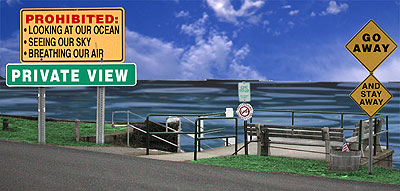

 |
 |
 |
The town strikes back. |
| Well, well. Turns out that our lawyer is a whole bunch smarter than your lawyer, cornfielders! | |
| Thought you'd just waltz into court and steal public land, did you? Not going to happen. | |
| I bet the Cornfielders weren't feeling so smug anymore after they heard this! The town's strategy is nothing short of brilliant. Read on - it's starting to get fun now. Click the link at the botom of the story to go on to the next one. | |
| This story © 2002, The Hartford Courant, reproduced with their kind permission. Please respect the Courant's ownership of this material. You may print this page for your personal use, or refer others to this page, but may not otherwise copy or retransmit this information in any form. | |
| Beach
Actually Owned By Town, Attorney Argues December 16, 2002 By CLAUDIA VAN NES, Courant Staff Writer |
|
|
Town Ponders Beach Lawsuit December 16, 2002 By CLAUDIA VAN NES, Courant Staff Writer OLD SAYBROOK -- The town is considering countersuing the Cornfield Point Association to either force it to open its Long Island Sound beach to the public or make the association liable for taxes on the property.The countersuit would argue that the association is a type of municipality and thus its property should be open to the public. The association sued the town earlier this month over the selectmen's decision to make shoreline road endings in Cornfield Point more readily accessible to the public. The town would remove lawns, hedges, wells and other barriers put up by residents over the years. Cornfield Point, like 13 other beach associations in town, owns beachfront restricted to association members but does not pay property taxes. The associations have some powers similar to those of municipalities, such as bonding and levying taxes on members. If a town countersuit failed to establish that the association was a public entity, town officials and attorneys argue, it would mean the association was private and its valuable waterfront land taxable. "The town would like to turn this into a beach rights case, but it's not," association attorney Richard Carella of Middletown said Friday. The association's suit asserts road endings in the Cornfield Point beach area are not the town's, but owned by the association. Town officials have said they wanted to clear road endings, in part to open up views of the sound to the general public and to reclaim the property. The road clearing move wouldn't open association beaches to the public, but a countersuit could. "They don't know what they got themselves in for when they decided not to work with us," said First Selectman Michael Pace, who plans to ask selectmen at their Wednesday meeting to endorse a countersuit. "You can't have the benefits of not paying taxes on your land for all these years and then turn around and say, `What's mine is mine and what's yours is mine, "' Pace said. A legislative act established the Cornfield Point Association and most other beach associations in town. The Cornfield Point Act of 1935 states the association has "exclusive charge and control of all roads ... not under state or town control." Carella said the road endings, found at the top of small cliffs that lead down to the association beach, aren't under town control because the town never used them for highway purposes and long ago abandoned them. Town Attorney Mike Cronin and Pace argue the town does control the roads to their very ends. Cronin, who has been researching the possible countersuit, said there has never been a legal case challenging the status of beach associations. If the town decides to countersue, it will look to the high-profile Greenwich town beach case, which established that municipally owned property is open to everyone, based on the U.S. Constitution. "It could be one step further to say this applies to beach associations," Cronin said. |
|